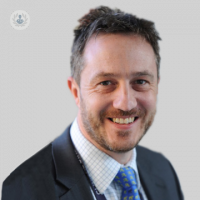How and where do hernias form?
Written by:Hernias are extremely common, and typically occur in one’s groin and in and around the belly button. In this article, esteemed consultant general and colorectal surgeon, Mr Matthew Tutton, explains how hernias form, and tells us how dangerous they can potentially be.

How do hernias form?
Hernias form when there is a weakness in certain points in the wall of one’s stomach. As a result of the weakness, things behind the wall can push through, which sometimes can be seen as fatty tissue or even a bit of bowel.
Hernias themselves tend to form in certain positions around the body. They are very commonly found in the groin, and also in and around the area of the belly button. Sometimes, if you have had an operation, and the stomach wall is supposed to be healing strongly, it doesn’t heal quite so well. When this happens, there is a risk of recurring wounds when the stomach doesn’t quite heal properly after incisions are cut after previous surgery. As a result, a hernia may form.
How dangerous are they?
First and foremost, hernias are extremely common. The majority of hernias carry a low risk, fortunately. There are, however, some hernias, that if they get stuck and cause pain, there is a risk that the contents in them (either fatty tissue or bowel contents) could have their blood supply compromised, which leads to strangulation. The bowel becomes threatened here as a result.
What are the main associated symptoms?
There are many symptoms associated with hernias. The main ones include the following:
- swelling
- lumps
- extreme pain/discomfort when lying down
- pain when coughing or after sudden movement
How are hernias detected?
Generally, a hernia is detected through a thorough inspection, and after carefully listening to the patient’s symptoms. The main symptom that will detect a hernia is swelling before or after getting up or going to bed.
When is hernia surgery performed, and is surgery always necessary?
Hernia surgery is typically performed if hernias are causing pain and/or discomfort, if they are increasing in size, or if they simply start affecting daily living. Hernias will never disappear on their own, and most, with time, will slowly get larger.
There are certain hernias where we would always recommend surgery. Femoral hernias will always require surgery, as there is a high risk of strangulation.
Mr Matthew Tutton is a highly experienced consultant general and colorecta surgeon who specialises in hernia detection and management. Consult with him today via his Top Doctors profile if you are worried that you might have a hernia.


